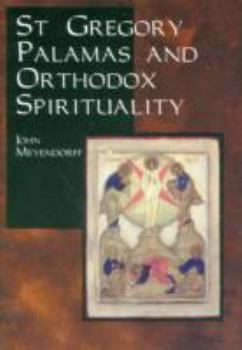St. Gregory Palamas and Orthodox Spirituality
Select Format
Select Condition 
Book Overview
This study of Orthodox spirituality traces the development of Orthodox mysticism from the desert fathers through the patristic tradition to Byzantine hesychasm and its heritage in Russian monasticism.... This description may be from another edition of this product.
Format:Paperback
Language:English
ISBN:0913836117
ISBN13:9780913836118
Release Date:December 1974
Publisher:St. Vladimir's Seminary Press
Length:174 Pages
Weight:0.45 lbs.
Dimensions:0.5" x 5.0" x 7.2"
Customer Reviews
3 ratings
There is one transcendent reality
Published by Thriftbooks.com User , 14 years ago
The first half of this book deals with Eastern monastic practices, highlighting its strengths and perils. This section of the book is of interest primarily to academics who focus on monasticism. The second half of the book outlines St Gregory's life, his conflict with Barlaam, and the resulting theology. The book concludes with a look at modern hesychasm in Russia. Meyendorff notes that Palamas did not exactly oppose Aristotelianism, per se (thus blunting a common charge made by Catholic scholars, notably von Balthasar). He saw it as a useful system, provided that one did not get carried away into excesses with it. I assume most readers are familiar with the details of Barlaam. Of importance is Barlaam's actual theology. Barlaam, following a nominalistic agnosticism, thought that the monks were saying one could bodily see the divine essence. 1) Barlaam said that all knowledge is sense-perception. 2) God, being defined as a Platonic postulate, is beyond sense-perception. Therefore, any knowledge/communion with God can only come from "intermediaries" (102). Palamas responds thusly: He is going to say that we do have a direct experience with God but we do not know the "essence" of God. How can he say this? First, God is essentially apart from other creatures because he is "uncreated." Therefore, when creatures participate in God, they participate in "uncreated life." Still, this does not yet address Barlaam's challenge. Palamas will thus say that revelation, participation, deification, is a free act (energy) of the living God (118-119). Therefore, we see a distinction between the divine act of revelation and the unknowable essence. This does not introduce a fourth term in the Godhead since God in his simplicity is fully present both in the essence and the energy. Conclusions and Implications of Palamism: 1. There is no autonomous reality between God and creatures because God himself, in his condescension, is that reality (122). 2. The victory of Palamism protected the East from the onslaught of the Renaissance (94). 3. Palamas reestablished the dignity of matter, since the body fully participates in the energies of God (108). A corollary of this is a revitalization in the sacraments, for the new life in Christ is present in the sacraments. I close with a quote from Meyendorff, A...decision was set before the Orthodox Church in the fourteenth century: a choice between a unitary (integral) concept of man based on the Bible, affirming the immediate efficacy of redemptive grace in every sphere of human activity, or the choice of an intellectualized spiritualism claiming independence for the human intellect...and denying that any real deification is possible here below. There is no doubt that the secularism of the modern age is the direct consequence of that second choice (171).
A corrective to arid Scholasticism
Published by Thriftbooks.com User , 18 years ago
The 14th century Byzantine saint Gregory Palamas isn't well known by western Christians, but he ought to be. He was the most influential critic of the arid and Aristotelian scholasticism that had overtaken the Latin church (under the influence of figures such as Thomas Aquinas) and that was threatening to infiltrate the Greek church (under the influence of Barlaam, a convert to Orthodoxy). In criticizing the new Scholasticism, Palamas reaffirmed the ancient tradition of hesychasm and heart-mysticism characteristic of eastern Christianity--a tradition, sadly, that's utterly foreign to contemporary Protestantism, and under-developed in Roman Catholicism. Meyendorff provides a pretty good overview of this ancient tradition, Palamas' 14th-century defense of it, and its later expressions, particularly in Russian Orthodoxy. Curiously, given the book's title, the section devoted explicitly to Palamas is both the shortest and the least informative. Over half the book is devoted to the spiritual tradition of hesychasm as practiced and advocated by the early desert hermits, Evagrios Pontikos, Makarios, Symeon, Maximos, and Gregory Nyssa. Although the paucity of information on Palamas is a bit disappointing, this section on his precursors by itself makes the book well worth reading. In addition, the entire text is beautifully illustrated. In addition to discussing the remembrance of God aimed for by the hesychast tradition's advocacy of silence, ceaseless prayer, and virtue, Meyerdorff also touches on the doctrine of theosis (the tragically-neglected in the west doctrine of deification) as well as the debate between Palamas and Barlaam. This dispute is really important, although at first sight it appears rather esoteric. The debate centered around whether it's ever possible to 'know' God. Barlaam, following Scholastic neo-Aristotelianism, insisted that all knowledge necessarily originates with the senses. Since God is nonmaterial, any putative 'mystical' encounter with God must be subjective. Palamas defended the Orthodox (and, I would add, scriptural) position that although God's essence is unknowable, God's energy is not. The distinction between essence and energy is essential for salvaging the darkness of the Creator on the one hand and the God-revealing Incarnation on the other. I agree with earlier critics that the book could've been better proofread, that the binding is weak, and that the want of a bibliography is troublesome. But in this day and age of 'google,' bibliographical references can easily be traced, and wonderful translations of all the authors quoted by Meyendorff are available.
Excellent Introduction
Published by Thriftbooks.com User , 20 years ago
This book is an excellent introduction to St. Gregory Palamas and Hesychasm. It explains to the reader why this Christian belief and practice is so important to us today. Also recommended is The Moutain of Silence by Kyriacos C. Markides.





